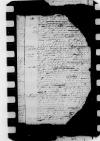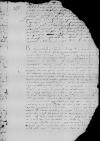List #2457
[Ioannes DANTISCUS] do [Samuel MACIEJOWSKI][Heilsberg (Lidzbark Warmiński)], 1541-07-15
Regest polski:
Dantyszek wyraża radość z nominowania Samuela Maciejowskiego na biskupstwo płockie pomimo niechęci nieprzyjaciół. Obszerniejszy list w tej i innych sprawach prześle przez Jana Holstena, który wiezie 50 florenów od torunian i 10 od wojewody pomorskiego [Jana Konopackiego].
Dantyszek załącza do listu opis przebiegu swojego konfliktu z pewnymi mieszkańcami Królewca. Prosi Maciejowskiego o zadbanie, by mógł bez przeszkód korzystać ze swobody jurysdykcji kościelnej oraz praw i regaliów, nadanych jemu i jego poprzednikom przez papieży i władców świeckich. Dantyszek uważa, że skoro książę [Albrecht] zezwala (a może nawet rozkazuje) swoim poddanym naruszać te prawa, to i on sam powinien móc czynić podobnie, a jego poddani, nie zawsze sprawiedliwie traktowani przez księcia i jego sędziów, powinni mieć prawo do apelacji u króla lub jakiejś innej procedury odwoławczej. Wolałby jednak, by tak jak dotychczas, król nie był nękany tego rodzaju sprawami.
Dantyszek poleca opiece Maciejowskiego sprawy doręczyciela tego listu, syna (huius adolescentis) sędziego ziemskiego chełmińskiego [tj. jednego z synów Jerzego Plemięckiego, zapewne Jana lub Bartłomieja].
Przybyły właśnie Mikołaj Płotowski napotkał nowe trudności w objęciu części majątku proskrybowanego Alexandra [Scultetiego]. Z rozkazu króla [Zygmunta I] brat proskrybowanego [Ignatius Sculteti] ma dowieść, że ta część nie przynależy Aleksandrowi, ale jemu i jego matce. Nie stawił się jednak w żadnym z trzech terminów wyznaczonych na to przez podskarbiego malborskiego [Stanisława Kostkę]. Dantyszek prosi adresata, by za jego przyczyną sprawa została bez dalszych wybiegów i zwłoki załatwiona na korzyść Płotowskiego.
Załącznik:
Dantyszek objaśnia szczegółowo przebieg konfliktu pomiędzy poddanym księcia pruskiego Albrechta, Bartholomeusem Vogtem i jego (niewymienionymi z imienia) towarzyszami, a poddanymi królewskimi z miasta Elbląga o spadek po Georgu Langerbeinie. Na mocy wyroku, wydanego przez Dantyszka 27 czerwca [1541] w Braniewie, strony miały przedstawić swoje prawa do spadku przed radą i sądem miasta Reszla. Bartholomeus Vogt wraz ze swoimi towarzyszami odmówił uczynienia tego i wbrew wyrokowi Dantyszka zażądał oddania mu całości schedy. Elblążanie Lucas Helm i Sebald Wartenberg natomiast stawili się przed sądem reszelskim i dowiedli swoich praw z tytułu pokrewieństwa ze zmarłym. Na ich wniosek sąd reszelski nałożył areszt na Vogta do czasu spodziewanego przybycia do Reszla tamtejszego starosty [Georga von Höfen], w celu uniemożliwienia aresztowanemu opuszczenia miasta bez zadośćuczynienia za bezprawnie zawłaszczony wcześniej spadek.
Tegoż dnia Vogt złożył oświadczenie przed burmistrzem, że dotrzymał ustanowionego przez Dantyszka terminu rozprawy, nie wspomniał jednak o nałożonym na siebie areszcie i potajemnie wymknął się z miasta. O całym przebiegu sprawy rada miasta Reszla powiadomiła drugą stronę na piśmie.
Dantyszek zwraca uwagę, że Vogt został proskrybowany w Elblągu oraz usunięty z rady miasta Królewca, zaś jego deklaracja, jakoby odwołał się w przepisowym terminie jednego roku od wcześniejszego wyroku Dantyszka w tej samej sprawie [wydanego 26 stycznia 1540, CIDTC, IDT 593], nie jest zgodna z prawdą. Wprawdzie jeden z jego towarzyszy odwołał się wówczas do Rady Pruskiej, nie była ona jednak właściwym adresatem apelacji, ponieważ Dantyszek nie podlega jej jurysdykcji. Dlatego też Dantyszek zwraca się do Maciejowskiego z prośbą o interwencję na wypadek, gdyby Bartholomeus Vogt zdecydował się złożyć apelację do króla. Podkreśla, że apelacja taka byłaby złożona po terminie.
Prosi także Maciejowskiego, aby powiadomił króla, że Georg Langerbein, jako urodzony w Reszlu duchowny, przejąwszy po śmierci siostry jej tamtejszy majątek w pieniądzach, złocie i srebrze, zbiegł do Królewca, gdzie zmarł jako apostata. Mówi się, że ponad czterysta grzywien z jego schedy trafiło w ręce księcia Albrechta, o co Vogt nie ośmielił się upomnieć. Część tego spadku należy się Dantyszkowi z tytułu apostazji kapłana będącego pod jego jurysdykcją. Dantyszek prosi Maciejowskiego o uzyskanie u króla, by ten zechciał zachować go przy tym, co należy mu się zgodnie z prawem, oraz o spowodowanie wystosowania w tej sprawie listu królewskiego do księcia Albrechta.
Rękopiśmienne podstawy źródłowe:
Pomocnicze podstawy źródłowe:
| ||||||||
Tekst + aparat krytyczny + komentarzZwykły tekstTekst + komentarzTekst + aparat krytyczny
Reverendissime mi Domine.
Exprimere nequeo, quanta laetitia gestiam, quod serenissima
In praesenti mitto negotium cum ill[is] de
Sin vero, sit liberum similiter subditis m[eis], qui plerumque multis afficiuntur iniuriis a
Quod reliquum est, me fraterno Reverendissimae Dominationis Vestrae amori et negotia huius adolescentis[1] domini
Postscript:
Hac hora noster
Rogo itaque, intercedat pro
Reverendissime in Christo Pater et D[omine], ... observande.
Salutem et fraternorum o[bsequiorum meorum commendationem].
Causam ... , quam cum complicibus suis iure agit contra [subditos] serenissimae
Quo cum feria secunda post divi Ioannis Baptistae festum[2], p[rout] a me institutum fuerat, convenissent
Quod
Quocirca cum
Eo die nondum peracto
Ex hac actione ...
Proinde impense oro, si iterum quer[e]lis suis iniquis
Quod vero impudens nugator
Ceterum serenissimae
Est porro aliud, quod me contra
[Cui] omnia faustissima , utque hanc longam scriptionem p... se necessaria instructione boni consulat, precor [ex] animo.
Datae
[1 ] Probably
[2 ] Feria secunda post divi Ioannis Baptistae festum - June, 27



